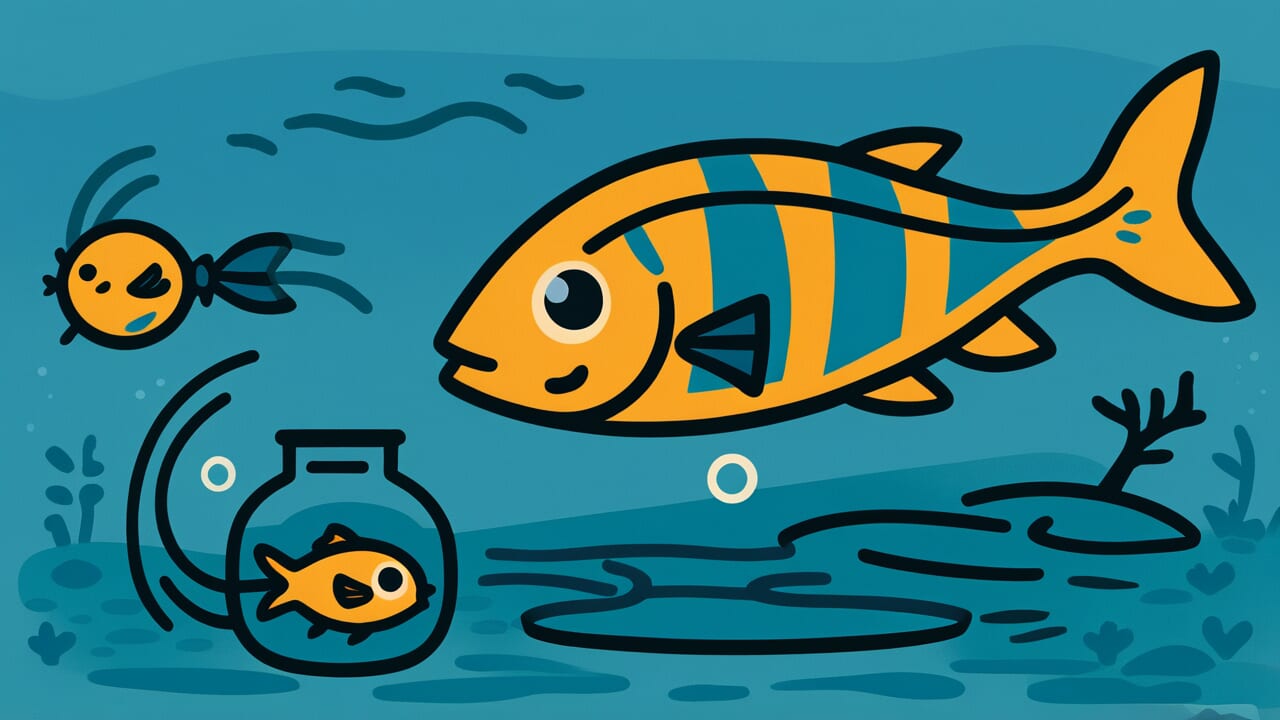How to Read “Only small fish get caught in the net”
Ami ni kakaru wa zako bakari
Meaning of “Only small fish get caught in the net”
This proverb means that talented or capable people are not easily caught. Instead, only mediocre people get trapped.
People use this saying when trying to recruit talent or when attempting to lure someone with a strategy. Truly excellent people are cautious and have good judgment. They don’t fall for simple invitations or traps.
On the other hand, people with average abilities or little experience cannot see the danger. They get caught easily.
Even today, people use this expression when talking about corporate hiring or fraud victims. Companies prepare good conditions to attract excellent talent. But the people they want don’t come, and only disappointing applicants show up.
The saying also describes ironic situations where someone sets a clever trap. The real target doesn’t get caught, but unimportant people fall for it instead.
Origin and Etymology
The exact first appearance of this proverb in literature is unclear. However, it likely emerged naturally from Japan’s fishing culture.
“Getting caught in the net” literally describes fishermen setting nets in the sea or rivers to catch fish. “Zako” means small fish of little value.
Fishermen repeated the work of setting and pulling up nets every day. Through this experience, they noticed a pattern. Truly valuable large fish were cautious and didn’t get caught easily. Meanwhile, inexperienced small fish or less cautious fish kept entering the nets.
This observation from fishing grounds gradually became a metaphor for human society. The saying gained persuasive power in situations involving a relationship between “the catcher” and “the caught.”
This includes recruiting talent or setting traps to capture someone. The more excellent a person is, the more careful they are. They don’t fall into traps easily.
Conversely, people with lower abilities or less experience get caught more easily. Our ancestors’ keen observation created this proverb. They overlapped this truth of human society with the familiar work of fishing.
Usage Examples
- We posted a job opening seeking excellent talent, but only small fish get caught in the net—the people we really want aren’t responding at all
- Police arrested the fraud group in a sweep, but only small fish get caught in the net—the mastermind escaped
Universal Wisdom
The truth this proverb tells is the correlation between ability and caution in human society. Why don’t excellent people get caught easily?
It’s because people with superior abilities have gained much experience while developing their skills. They have cultivated judgment. They don’t judge things by superficial conditions alone. They have the power to see through hidden intentions and dangers.
Meanwhile, those with less experience or lower abilities jump at the bait in front of them. This isn’t necessarily because they’re foolish. It may be because they haven’t been hurt yet. People learn through repeated failures and develop caution.
This structure creates a serious dilemma for those trying to catch others. The more you try to obtain truly valuable targets, the more cautious they become. They won’t approach you. As a result, only disappointing targets gather around you.
This phenomenon appears not just in hiring, but in all human relationships. This includes romance, friendships, and business partnerships.
Our ancestors found this ironic truth in the everyday work of fishing. The difficulty of obtaining valuable things. The lesson that you can never get the real thing through easy methods.
This wisdom continues to teach us the importance of effort and sincerity across time.
When AI Hears This
Looking only at fish caught in the net and concluding “this sea has only small fish” is a fatal statistical error. Fish larger than the net’s mesh or smart fish that avoid nets aren’t included in the sample at all.
We call this observation selection bias.
For example, imagine a fisherman using a net with 5-centimeter mesh. This net catches 90 percent of 3-centimeter fish. But 10-centimeter fish have a high probability of breaking through and escaping.
So the fisherman believes “this sea has only small fish.” But in reality, the observation device—the net itself—is distorting the data.
What’s scarier is that we can’t even notice the possibility that “big fish avoided the net.” We mistake the data in front of us for everything. This is the essence of survivorship bias.
Hearing only success stories and believing “this method leads to success” has the same structure. People who failed and disappeared aren’t talked about in the first place.
The sharpness of this proverb lies in recognizing that the limitations of the net as an observation tool inevitably create limitations in perception. We’re always viewing the world through some kind of net, yet we tend to forget that net exists.
Lessons for Today
This proverb teaches us the harsh reality that obtaining truly valuable things is impossible through easy methods. If you want excellent talent, don’t just cast a net and wait.
You need to become an attractive presence yourself. Good talent has the eye to recognize good environments.
In modern society, this lesson applies not only to those hiring but also to those being hired. To avoid becoming “small fish” yourself, cultivate caution and judgment.
Don’t jump at sweet offers easily. Develop the power to see through the truth behind them. This doesn’t mean becoming suspicious. It means understanding and valuing your own worth.
This proverb also teaches humility. If you feel you’ve easily “gotten caught in the net,” it might be a chance for growth. Reflect on why you got caught.
Learn so you can make wiser choices next time. Life is a continuous process of learning from failures. What matters is developing an eye for recognizing the real thing as you gain experience.



Comments